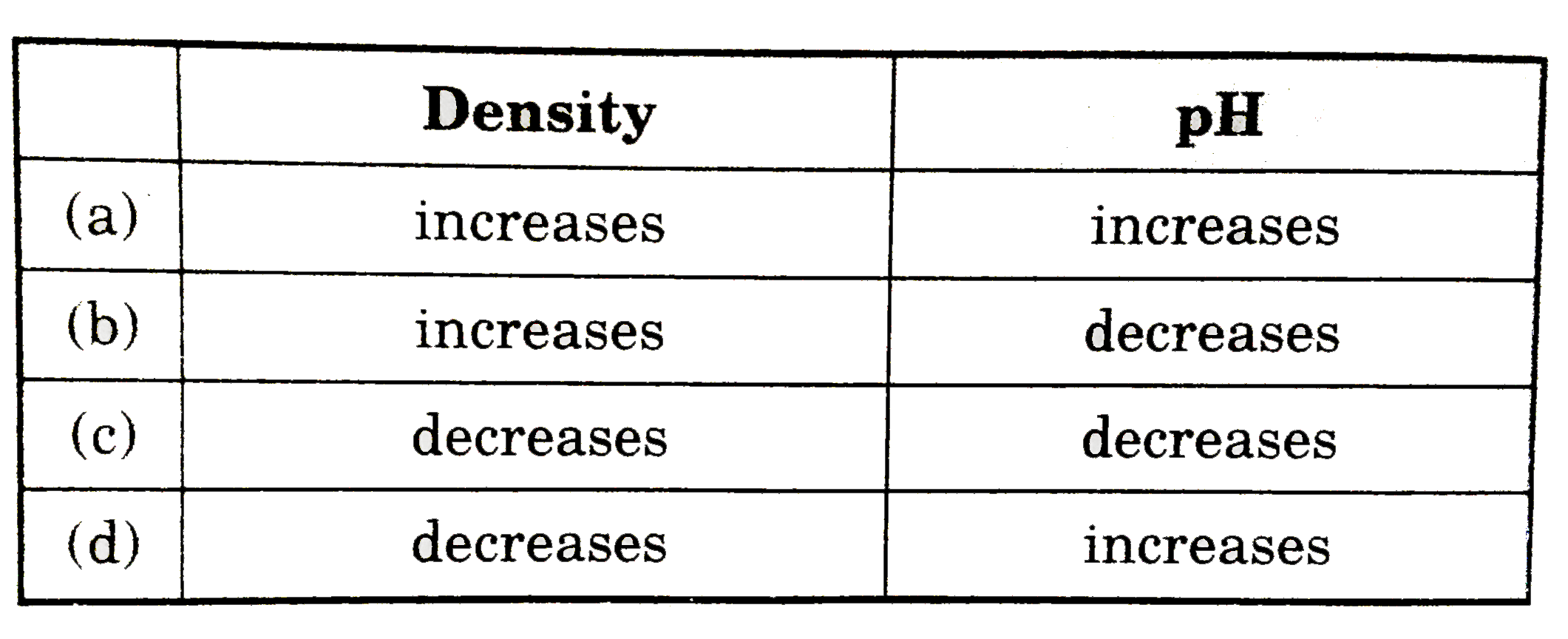The electrode reactions for charging of a lead battery are
PbSO4+2e−→SO2−4+Pb
PbSO4+2H2O→PbO2+SO2−4+4H++2e−
The electrolyte in the battery is an aqueous solution of sulphuric acid after the battery has been charged.
The sulphuric acid will be more concentrated
The sulphuric acid will be less concentrated
The concentration of sulphuric acid will be unchanged
Sulphuric acid will have been completely decomposed
The correct Answer is:A
AsH2SO4 is produced n reaction.
Topper's Solved these Questions
- ELECTROCHEMISTRYBOOK - MARVEL PUBLICATIONCHAPTER - ELECTROCHEMISTRYEXERCISE - Previous years Entrance Exams MCQ
55 Videos
- ELECTROCHEMISTRYBOOK - MARVEL PUBLICATIONCHAPTER - ELECTROCHEMISTRYEXERCISE - Test your Grasp
50 Videos
- D AND F BLOCK ELEMENTS BOOK - MARVEL PUBLICATIONCHAPTER - D AND F BLOCK ELEMENTS EXERCISE - TEST YOUR GRASP
60 Videos
- GENERAL PRINCIPLES AND PROCESSES OF ISOLATION OF ELEMENTSBOOK - MARVEL PUBLICATIONCHAPTER - GENERAL PRINCIPLES AND PROCESSES OF ISOLATION OF ELEMENTSEXERCISE - Test Your Grasp
30 Videos
Similar Questions
The electrode reactions for charging of a leas storage battery are :
PbSO4+2e−=Pb+SO2−4
PbSO4+2H2O=PbO2+SO2−4+4H+2e−
The electrolyte in the battery is an aqueous solution of sulphuric acid. Before charging, the specific gravity of the liquid was found to be 1.11 (15.7% H2SO4 by weight). After charging for 100 hours, the sp. gr. of the liquid was found to be 1.28 (36.9% H2SO4 by wr.). If the battery contained two litres of the liquid, calculate the average current used for charging the battery.
NB. (e−) denotes electrons. Assume that the volume of the battery liquid remained constant during charging. 1 faraday = 96500 coulombs.
View SolutionPb(NO3)2+H2SO4→PbSO4⏐↓+2HNO3
View Solution
Knowledge Check
The electrode reactions for charging of a lead battery are :
PbSO4+2e→Pb+SO2−4
PbSO4+2H2O→PbO2+SO2−4+4H++2e
The electrolyte in the battery is an aqueous solution of H2SO4. After this battery has been charged:Athe sulphuric acid will be more concentratedBthe sulphuric acid will be less concentratedCthe concentration of H2SO4 will be unchangedDH2SO4 will have been completely decomposedPb/PbSO4_((s)),SO−24(aq)
Pb(s)+SO−24⇔PbSO4(s)+?Ae−B3e−C2e−Dno electronPb(NO3)2+H2SO4→PbSO4⏐↓+2HNO3
AFor precipitate formation reactionBFor precipitate dissolution reactionCFor precipitate exchange reactionDFor no reaction
Pb(NO3)2+H2SO4→PbSO4⏐↓+2HNO3
View SolutionThe equation for one of the half-reactions in a lead storage battery is :
PbO−(2)+4H++SO2−4+2e−→PbSO4+2H2O
What happens to the properties of the electrolyte as this

View SolutionAssertion : Reverse current flows in charging of lead storage battery:
Reason : During charging PbSO4 convery into Pb and PbO2
View SolutionIn the reaction
1. H2O2+O3→H2O+2O2
2. PbS+4O3→PbSO4+4O2
View SolutionAssertion : Reverse current flows in charging of lead storage battery:
Reason : During charging PbSO4 convery into Pb and PbO2
View Solution
